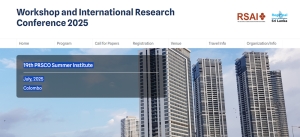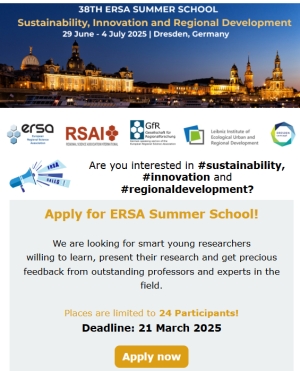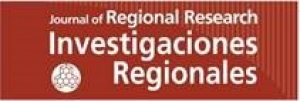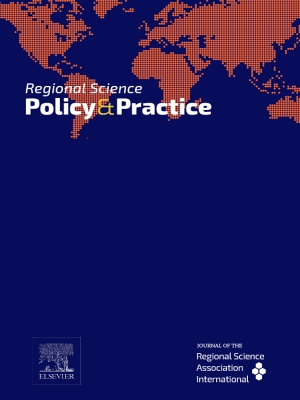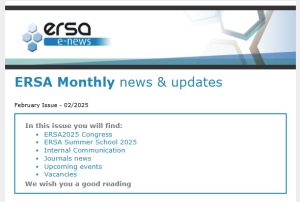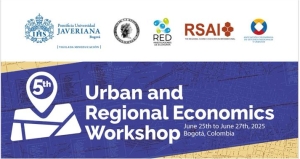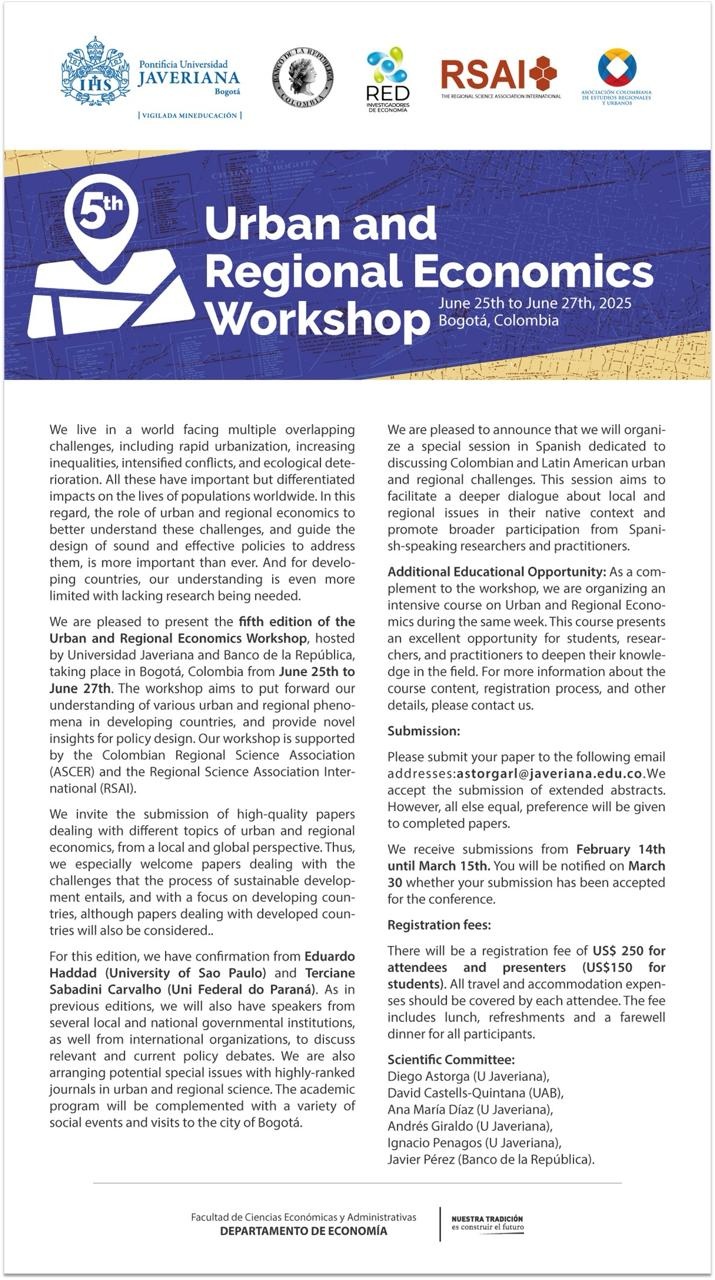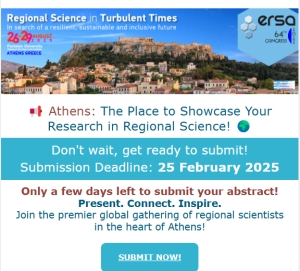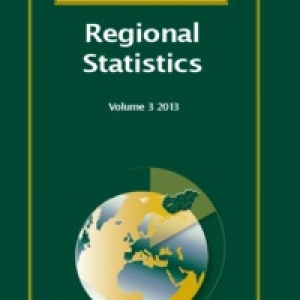RSPP Special Issue Award
Elisabete Martins
Doctoral Student Conference 2025 of ASRDLF, 29-31 January 2025, Iași, Romania
The French Speaking Section (ASRDLF) of ERSA is happy to announce the Doctoral Students Annual Conference 2025.
The ASRDLF Doctoral Programs are aimed at doctoral students and researchers working on territorial and regional issues in the human and social sciences (planning, economics, urban planning, geography, management, history, law, political science, sociology, etc.).
They are a time for privileged exchanges and debates between young researchers and established researchers. They take the form of thematic or methodological workshops during which doctoral students present their thesis work to several teacher-researchers, established researchers and other young researchers in order to share perspectives, enrich experiences and gather advice on their work.
In addition, there is a guest lecture, a plenary session entitled “What life after the thesis?” », where academics and non-academics are present, led by two doctoral students, as well as a round table bringing together several associate editors of journals in the field of regional science, entitled “Publishing and promoting your thesis work” led by a confirmed researcher and/or a doctoral student. In parallel with these sequences, the Doctoral sessions are also punctuated by friendly moments (speed-dating and informal exchanges, in particular during coffee breaks, lunches, the welcome cocktail, etc.).
As usual, in 2024 all the general and recurring themes addressed in the ASRDLF’s research, theses and scientific events will be covered during the Doctoral sessions. Consequently, regardless of their thesis subject and the methods used (quantitative and/or qualitative), all doctoral students will be able to present their research work in progress.
Submission of proposals
Deadline: 30 November 2024
Response to authors: early December 2025
Submission procedures: see the 2025 Doctoral website
Notes:
PhD students must be up to date with their annual ASRDLF membership fee. All information on how to join is available on this link.
If you participated in the ASRDLF Strasbourg 2024 annual conference, you are already a member of the association.
For successful proposers (PhD students) as well as for teacher-researchers, researchers, non-academics, lunches and coffee breaks are free.
The costs of transport, accommodation and other meals are the responsibility of the participants.
Call for Abstracts | 19th PRSCO Summer Institute in 2025. Renuka City Hotel, Colombo, Sri Lanka, July 24–25, 2025
Call for Abstracts, The 19th PRSCO Summer Institute in 2025.
Renuka City Hotel, Colombo, Sri Lanka, July 24–25, 2025.
Key dates
December 1, 2024: Abstract submission opening
March 31, 2025: Abstract submission deadline
April 30, 2025: Notification of abstract acceptance
May 1, 2025: Early bird registration open
May 31, 2025: Early bird registration end
July 24 and 25, 2025: Conference
More information: https://regionalsciencesl.lk/
Apply for ERSA Summer School in Dresden, Germany, 29 June - 4 July 2025
|
New Issue 61 of Investigaciones Regionales - Journal of Regional Research
Investigaciones Regionales - Journal of Regional Research has published the 61th Issue, the first volume corresponding to 2025.
Below you will find the summaries of the papers published in this volume, which can be accessed at https://investigacionesregionales.org/en/revista/12261/
We invite authors to submit papers at https://investigacionesregionales.org/en/envio-de-articulos/submission-of-papers-and-others-contributions/
Special Issue 2025 - Issue 61: Long term care and community innovation
Editorial
Raquel Martínez Buján, Magdalena Díaz Gorfinkiel
Long term care and community innovation
The article carries out a brief analysis that relates the development of long-term care in Spain in recent years with the initiatives developed in different territories. It is framed within the deliberation and reflection processes regarding the reforms of public care policy in Spain in a post-pandemic context, reflecting the interest in policy methods and practices with a community approach organized from different territorial realities. Two specific experiences from Latin America and a comparative analysis with Sweden are also addressed, with all cases intended to contribute to the review of different territorial approaches to innovative practices in long-term care.
Keywords: Long term care; territory; post-pandemic; Spain
Articles
Magdalena Díaz Gorfinkiel, Begoña Elizalde San Miguel, Elin Peterson
This article analyses the situation of the Home Care Service in the two European cities of Madrid and Stockholm. There are significant differences in the development of this service in these cities which can explained by their diverse welfare models. At the same time, they also show similar trends, such as an ageing population and new demands by the elderly. The text focuses on the evolution of the service in three different dimensions: governance, working conditions and the tendering/monitoring system. The analysis is based on qualitative research, showing the predominant discourses among the key actors involved in the design and provision of the service. The results reveal the urgent need to redefine this service to respond to the new demands of the elderly as well as the changing regulatory frameworks.
Keywords: Ageing societies; Home Care Service; Madrid; Stockholm
Raquel Martínez-Buján, Paloma Moré, Antía Eijo Mejuto
This article analyses the market dynamics of long-term care provision in households. Specifically, it focuses on exploring the rise of three new business actors in the sector, namely brokering agencies, digital platforms and care workers’ cooperatives. Through a qualitative methodology based on semi-structured in-depth interviews and participatory workshops with key informants, the business models of these commercial actors and their impact on working conditions in the sector are analysed, given the contrasting philosophies with which each of them manages the services provided. The document studies the impact of these actors on the care market and on the processes of formalisation and professionalisation of the sector.
Keywords: Home care; domestic service; worker cooperatives; digital platforms; brokering agencies
Noelia Teijeiro Cal
Self-managed collaborative housing for older people: motivations, challenges and demands
This article explores the rise of collaborative housing among older adults in Spain. These initiatives, emerging from social movements, reflect a grassroots model of living that aims to redefine the aging process through collective self-management of this life cycle. Using a qualitative methodology, five cohousing communities in different regions, including rural areas facing demographic challenges, are studied. The article addresses the relationship between the concept of “commons” and feminist theories of social reproduction. These housing arrangements will be examined in terms of their dynamics, demands, limitations, and interactions with both public and private sectors.
Keywords: Collaborative housing; community; aging; care
Irene Lebrusán Murillo
This article aims to investigate the effects and potential that the creation of community and the promotion of bridging social capital can have on the adherence of the elderly population to projects aimed at improving their quality of life. To this end, it is based on the analysis of two practical projects carried out in the city of Zamora and which form part of the research on a model of quality of life in old age: the promotion of physical capacity and the tackling of unwanted loneliness through volunteering. The results are based on information from each of the experimental programmes and testimonies obtained from the researchers of each of these projects, fieldwork teams and participants (beneficiaries). the results show that activities that involve people in the pursuit of a common goal are effective ways of fostering social bonds and the idea of community.
Keywords: Old Age; ageing; quality of life; community; bridging social capital
Margarita Barañano Cid, Pedro Uceda Navas
Elders, circles of care and territory. Care networks in vulnerable neighborhoods of Madrid
The care that involves older people in vulnerable Madrid neighborhoods is favored by the prolonged permanence of this age group in these spaces and by the existence in them of broader networks of this activity, both in terms of concern, reception and care provision. The circulation of care includes their homes and also other neighborhood supports. Through qualitative analysis, it is confirmed that family care is more present in the narratives referring to the most peripheral and aging neighborhoods, with more permanence and home ownership.
Keywords: Elders; care networks; care circles; vulnerable neighborhoods; residential permanence
Marina Sagastizabal Emilio-Yus, Amaia Eiguren Munitis
Contemporary society is older and more diverse than ever before. In the face of increasing demand for care provision, there is an urgent need for new social responses. Intergenerational projects represent a step in this direction, through the construction of community spaces that strengthen both the relational dimension of care and promote social cohesion. The particular case study addressed in this paper is an intergenerational public-community project in Vitoria-Gasteiz, Spain. This project facilitates the generation of networks of mutual care between at risk children and elderly people. Using a qualitative methodology, this paper analyses some of the achievements and limitations. The conclusions suggest a need to further support and sustain projects of this type, which promote a more inclusive society for people of all ages.
Keywords: Intergenerational; public-community care; elderly people; children; Basque Country
Christel Keller Garganté, Sara Moreno Colom
Local policies to promote care communities: the case of VilaVeïna
The aim of the article is to analysis the VilaVeïna project promoted by the Barcelona City Council to develop neighbourhood care communities. Specifically, the manuscript analyses to what extent VilaVeïna fits into the proposals for the transformation of public care policies and services from the perspective of the commons. On the one hand, it analyses the initial conceptualisation of the community in the design of VilaVeïna and its materialisation in the practices involved in its implementation. On the other hand, this analysis puts in dialogue the elements that characterise the project within the framework of the community with the conceptual proposal of the commons (Zuriña, 2020; Blanco et al., 2017). To reach these objectives, we present a case study based on interviews with political and technical profiles, as well as interviews and focus groups with users of the service. The results show up the progress made by this public policy in building communities of care and the limitations in achieving a radically communitarian resource defined from the perspective of the commons.
Keywords: Community; care; public policies; common goods
Félix Arrieta, Martín Zúñiga, Bakarne Etxeberria
The main objective of this article is to analyze the different care ecosystems developed in the Territory of Gipuzkoa, emphasizing the leadership, relationships and distribution of functions that occurs among the different agents that participate in their implementation. The methodology has been eminently qualitative, developed through a total of 12 in-depth semi-directed interviews with professionals from the public sphere (politicians and technicians) and Third Sector entities. The results show that, although the development of care ecosystems is recognized as a succesful political strategy in the territory, and a clear space of social and political consensus, its extension and consolidation may be in question.
Keywords: Ecosistems; care; governance; leadership
Matxalen Legarreta-Iza, Unai Villena-Camarero, Elena Martinez-Tola
Long-term Care Local Ecosystems: a proposal for evaluation
Demographic change and aging are general trends that have led to an increase in the demand for long-term care. The covid-19 pandemic bought this need for care to the forefront of the political agenda. In response, the Provincial Council of Gipuzkoa and the Basque Government have begun to support innovative public-community initiatives called Local Care Ecosystems. This article describes the design of an evaluation process guided by Theory of Change, which was developed by the pioneering initiative Pasaia Zaintza HerriLab [Pasaia Care Local Laboratory] for the development of a Local Care Ecosystem in the local municipality of Pasaia, Gipuzkoa. The paper provides useful insights for evaluating other public-community care initiatives and contributes to promoting a culture of evaluation within the institutions.
Keywords: Local Care Ecosystems; long term care; public-community initiatives; evaluation; Theory of Change
Daniel Prieto Sancho
This article proposes an approach to the imaginary that is constructed in the social understanding of a city that is cared for and cares for its citizenship, exploring whether the conceptual commitment to community care in the city can be understood within the hegemonic social representations that the population holds in this regard. Through a qualitative approach, we have explored the ways in which coexistence in the city is understood and the role that care and community play in it. The analysis of the discourses reveals a widespread understanding of a broken social bond that encourages the demand for institutional mediation between individuals and suspends the possibility of building community networks in an urban setting that fosters a shared perception of threat and distrust. These results suggest the need to address the reflection on the obstacle that hegemonic ideological frameworks pose for community initiatives that give meaning to urban coexistence in our culture.
Keywords: Community; the commons; caring cities; urban coexistence; individualism
Cristina Vega Solís
Far from presenting a univocal face, in Latin America, the public aspect of social policies and support for reproduction and care has been characterized by its ambivalence. Sometimes absent, sometimes present; operating remotely, marginally or arbitrarily; generating assistance support, focused or administered by intermediaries; with a benefactor but also criminalizing, authoritarian and patriarchal countenance. Reproduction in the State appears through agencies and agents that often operate in the same period under different and even contradictory logics. It is accompanied by private social work and other actors. The emergence of the community in the family, the neighborhood, the commune or the organization, as form of pressure on the public and simultaneously as an (relatively) autonomous construction of conditions of survival, reveals complex and changing resource articulations for the popular sectors. This text explores the applied logics of the public, the private and the common in the life of a street waste picker and her son with a health problem from birth. Through biographical interviews, I explore the multiple appearances and meanings that these areas acquire for the reproduction of health in relation to a life punctuated by precariousness and adversity. Inspired by the concept of expanded reproduction and the perspective on the margins of the State, I analyze the journey of class, gender and race of Mrs. Beatriz and her son.
Keywords: Extended social reproduction; social protection; margins of the State; beneficence; reproductive commons
María José Magliano, María Victoria Perissinotti
This article analyzes the relationship between public policy and the management of the common in the city of Córdoba, Argentina. Based on a qualitative methodology that combines in-depth interviews and documentary analysis, it reflects on the community “know-how” that supports the management of the common in urban peripheries. It shows that, in the context of the Covid-19 health emergency, this “know-how” was mobilized by women from popular sectors to respond to new challenges, while at the same time it was “incorporated” by different public policies to support the strategies of sustainability of life.
Keywords: Management of the common; community kitchen; public policies; State; Argentina
New Issue: Regional Science Policy & Practice | Volume 17, Issue 3, March 2025
|
|
|
|
|
|
|
|
ERSA Monthly E-news - February 2025
|
Position | Lecturer / Senior Lecturer, Australian National University
Lecturer / Senior Lecturer
Australian National University
Canberra / ACT, ACT, Australia, 2601
Fixed Term
Closing at: Mar 30 2025 - 23:55 AEDT
Position Description
Classification: Academic Level B or C
Salary package: $115,739 - $154,462 per annum plus 17% superannuation
Term: Full-time, Fixed term (up to 12 months)
(Applicants must be available to commence on or before 1 July 2025)
Join one of the world's leading centres for research, policy development and graduate training on the economy and society of Indonesia
Make a critical contribution to building the next generation of Indonesianists
Join one of the largest networks of Indonesianists in the world, including academics, policy experts and decision makers from both Australia and Indonesia
For more information: https://jobs.anu.edu.au/jobs/lecturer-senior-lecturer-canberra-act-act-australia-043dec33-9050-4e52-9a5f-9d7e3a853f21
5th Urban and Regional Economics Workshop, 25-27 June 2025, Bogota, Colombia
ERSA2025 Call for Abstracts (and) papers: Submit now!
|
The New Issue of Regional Statistics is already Available! (2025, VOL 15, No 1)
REGIONAL STATISTICS, 2025, VOL 15, No 1.
STUDIES
Dear Readers,
We are pleased to say that the 1/2025 issue of Regional Statistics has been published and available online!
CONTENT
Michal Apollo – Marta Dmytryshyn – Kamil Maciuk: Hidden costs of solidarity: the Ukrainian and Polish rental market at the beginning of the full-scale war in Ukraine
https://www.ksh.hu/statszemle_archive/regstat/2025/2025_01/rs150101.pdf
László György – Eszter Purczeld – Bálint Mazzag – Alex Bató – Péter Vékás: Harmonic development index: a novel approach to measure environmental, social, and economic development
https://www.ksh.hu/statszemle_archive/regstat/2025/2025_01/rs150102.pdf
Oksana Shubat – Anna Bagirova – Victor Latushkin – Andrey Setiaev: Fertility dynamics differentiated by birth order in Russian regions
https://www.ksh.hu/statszemle_archive/regstat/2025/2025_01/rs150103.pdf
Xosé Carlos Macía Arce – Francisco Xosé Armas Quintá – Francisco Rodríguez Lestegás – Yamilé Pérez Guilarte: Geographic research and the teaching of geography: an example regarding the initial phase of the Covid-19 crisis in Spain
https://www.ksh.hu/statszemle_archive/regstat/2025/2025_01/rs150104.pdf
József Poór – Tímea Juhász – Zdeněk Caha – Marzena Stor – Łukasz Haromszeki: Factors influencing labour shortages in Visegrad (V4) countries with regard to difficult economic environments
https://www.ksh.hu/statszemle_archive/regstat/2025/2025_01/rs150105.pdf
Andrea Diniz da Silva – Elizabeth Belo Hypólito – Fabio Lucas Pimentel de Oliveira – Marcus André Alves Zimmermann Vieira: Big data and statistical production in Latin America and the Caribbean: perspectives from national statistics offices
https://www.ksh.hu/statszemle_archive/regstat/2025/2025_01/rs150106.pdf
Tamás Vasvári – Erzsébet Pocsai: Borrowing dynamics of Hungarian local governments – a decade of experience
https://www.ksh.hu/statszemle_archive/regstat/2025/2025_01/rs150107.pdf
Éva Kármán-Tamus: Sensitivity and uncertainty analyses of a composite index measuring sustainable energy transition in the European Union
https://www.ksh.hu/statszemle_archive/regstat/2025/2025_01/rs150108.pdf
Join us to our social networking sites:
https://www.facebook.com/RegionalStatistics
https://ksh.academia.edu/RegionalStatistics
Join us to our social networking sites:
About Us
The Regional Science Association International (RSAI), founded in 1954, is an international community of scholars interested in the regional impacts of national or global processes of economic and social change.


